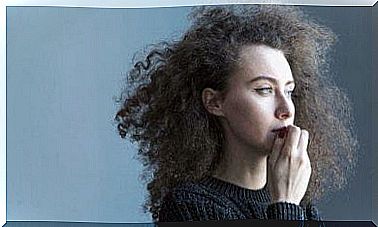Choosing A Kind Of Partner In Emotional Dependence

Often, people who have had a damaging and destructive relationship repeat the pattern with their new partners. It can be frustrating and painful to think you are unlucky in love. However, choosing a type of partner is not a coincidence, not even with emotional dependence.
Happiness doesn’t make you bond with the same kind of person over and over. Instead, your subconscious is leading you in the dark. That’s why you need to analyze your decisions and find out what motivates them.

Choosing a Kind of Partner in Emotional Dependence
Emotional dependence is a pathological style of bonding, which is based on an emotional deficit. The need for approval and the fear of abandonment are so intense that people often endure violation after violation. Their main goal is to make sure that the relationship doesn’t end.
When a couple breaks up, which is usually the decision of one of the partners, the emotionally dependent partner loses the mainstay they used to sustain themselves.
Then they experience a kind of withdrawal that leads them to want to commit to someone else as soon as possible. However, the pattern tends to repeat itself and the person is once again in a conflicted, unstable and painful relationship.
It often happens that a person wonders why after several similar experiences he always ends up in a relationship with cold and violent people. Why do you like people who affect your self-esteem even more? You must understand that it is precisely this absence of self-love that leads you to unconsciously choose a certain type of partner.
What are the characteristics of a “type”?
Sensitivity to idealization
People with an adequate emotional balance seek contact with similar people in order to establish a reciprocal and symmetrical exchange. Emotionally dependent people, on the other hand, are attracted to people they consider superior and tend to idealize them.
This perceived superiority generally does not mean that a person is truly special. Their high self-esteem and overflowing self-confidence arouse the fascination of an emotionally dependent person.
Dependent types believe they find what they lack in self-aggrandizing people: self-love. So it often happens that the dependent person is much more capable than their partner, but neither of them feel that way.
narcissistic
This form of “high” self-esteem often translates into narcissism and egomania. Indeed, the chosen objects are usually self-centered, manipulative, and lacking in empathy. They are cold and inaccessible individuals who are content with themselves and think they deserve all kinds of privileges.
Their overvaluation perfectly complements the undervaluation of an emotionally dependent person. This is because the latter praises them and surrenders what the narcissist believes they deserve.
Dominant
Another relevant characteristic when it comes to choosing a type is the dominant tendency of the new partner. This is because their narcissism leads them to seek and achieve a superior position in the relationship and they make those who value them their subordinates.
So there is another perfect binomial. This is because the emotionally dependent person will not overshadow the narcissist because of their low self-esteem. On the contrary, they constantly admire and praise him.
In addition, they ignore the person’s flaws and take all kinds of humiliation and contempt into the bargain.

Choosing a type – a perfect fit
After analyzing these characteristics, it is clear that the connection between emotionally dependent people and narcissists is not arbitrary. Their qualities and shortcomings complement each other perfectly, which means that each gets what he unconsciously seeks in the other.
This is not a conscious or deliberate decision. No one would ever voluntarily choose an exploitative and abusive person to share their life with. However, the cycle continues until they have the courage to look straight into the abyss.
So be careful if you identify with the above and often find yourself in asymmetrical and harmful relationships. Analyze what leads you to choose a recurring type in your relationships and try to find out its origin.
Only by working on your self-esteem will you be able to accept your fears and shortcomings. As you see, only then will you be in a position where you can relate as an equal, with love and respect.








